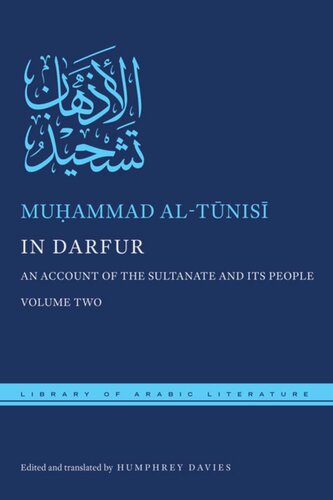

Most ebook files are in PDF format, so you can easily read them using various software such as Foxit Reader or directly on the Google Chrome browser.
Some ebook files are released by publishers in other formats such as .awz, .mobi, .epub, .fb2, etc. You may need to install specific software to read these formats on mobile/PC, such as Calibre.
Please read the tutorial at this link: https://ebookbell.com/faq
We offer FREE conversion to the popular formats you request; however, this may take some time. Therefore, right after payment, please email us, and we will try to provide the service as quickly as possible.
For some exceptional file formats or broken links (if any), please refrain from opening any disputes. Instead, email us first, and we will try to assist within a maximum of 6 hours.
EbookBell Team

4.3
8 reviewsA merchant’s account of his travels through an independent African state
Muhammad ibn 'Umar al-Tunisi (d. 1274/1857) belonged to a family of Tunisian merchants trading with Egypt and what is now Sudan. Al-Tunisi was raised in Cairo and a graduate of al-Azhar. In 1803, at the age of fourteen, al-Tunisi set off for the Sultanate of Darfur, where his father had decamped ten years earlier. He followed the Forty Days Road, was reunited with his father, and eventually took over the management of the considerable estates granted to his father by the sultan of Darfur. In Darfur is al-Tunisi’s remarkable account of his ten-year sojourn in this independent state.
In Volume Two al-Tunisi describes the geography of the region, the customs of Darfur’s petty kings, court life and the clothing of its rulers, marriage customs, eunuchs, illnesses, food, hunting, animals, currencies, plants, magic, divination, and dances. In Darfur combines literature, history, ethnography, linguistics, and travel adventure, and most unusually for its time, includes fifty-two illustrations, all drawn by the author.
In Darfur is a rare example of an Arab description of Africa on the eve of Western colonization and vividly evokes a world in which travel was untrammeled by bureaucracy, borders were fluid, and startling coincidences appear almost mundane.